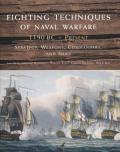Fighting Techniques of Naval Warfare analyzes the tactics, techniques, and weaponry of naval warfare from the ancient period to the modern day. Beginning with Egyptian Pharaoh Ramses III's victory over the piractical Sea Peoples in 1190 BC, and coming up-to-date with the use of aircraft carriers and the latest computerized weapons technology, the book covers every significant development in naval warfare over the last 3000 years.
The first chapter covers some of the major naval engagements of the ancient era, including the Greeks' emphatic victory over the Persians at Salamis (480 BC) and Octavian's decisive defeat of Mark Anthony at Actium (31 BC). The use of galleys as the premier fighting ship for more than 2000 years is explored in detail. The second chapter investigates the development of new types of fighting vessels, such as the northern European cog, at battles such as Sluys (1340 AD), which also offering expert analysis of the introduction of cannon at Hansando (1592) and the spectacular use of fireships against the Spanish Armada at Gravelines (1588). The third chapter examines the age of sail, from the early seventeenth century to the late eighteenth century, through famous encounters at the Downs (1639), Medway (1667), and Quiberon Bay (1759). The chapter rounds off with the Russo-Swedish battled of Svensksund (1790), demonstrating one of the last uses of galleys in European naval warfare. The fourth chapter surveys the transformation from the employment of the last great fighting sailing ships at battles such as Copenhagen (1801) and Trafalgar (1805) to the advent of steam-powered ironclads at Mobile Bay (1864). The final chapter covers the development and use of armored battleships at Tsushima (1905) and Jutland (1916), and the revolutionary introduction of aircraft carriers at Cape Matapan (1941) and Midway (1942).
Using specially-commissioned color maps and black-and-white artworks,Fighting Techniques of Naval Warfareis an essential companion for anyone interested in naval warfare.
